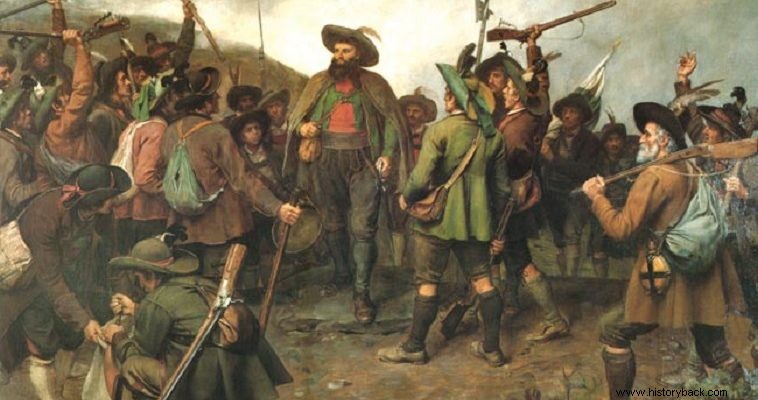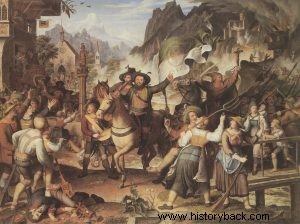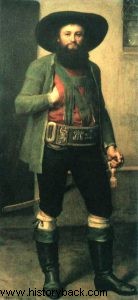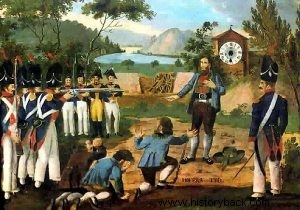
Andreas Hofer was born in 1767 in the Austrian province of Tyrol. His family ran an inn which he took over after his father's death. At the same time he was involved in the trade of wine and horses.
In 1791 he was elected a member of the local assembly of Tyrol, which enjoyed a status of autonomy within the Habsburg empire, and this because its inhabitants maintained a high spirit of independence. They declared themselves subjects of the emperor but kept the central administration's interference in their internal affairs to a minimum.
This spirit of independence led shortly afterwards to the amazing struggle of the Tyroleans against their French and Bavarian allies. In 1805 Hofer enlisted in the local militia as a sniper.
It is worth noting that thanks to their preoccupation with hunting and weapons from their childhood, the Tyroleans supplied the Austrian army with its best marksmen who formed elite "hunting" units. Hoffer rose to the rank of national guard captain .
However, the war ended with the defeat of Austria, which was forced to surrender Tyrol to the French ally Bavaria. The Bavarians did not respect their new subjects, the manners and customs, the habits and the commitments that applied during the Habsburg period, earning the unquenchable hostility of the Tyroleans.
Especially when they attempted to forcefully integrate Tyroleans into their army the reaction became general. The Tyroleans even sent a delegation to Vienna requesting support in the event of a revolution. Hofer was also a member of the delegation.
Returning from Vienna, Hofer began to organize his countrymen in anticipation of the uprising. Finally, the opportunity to rise up was given in 1809 with the outbreak of the new war between Austria and France. On April 9, 1809, the revolution was declared. Soon the rebels annihilated the Bavarian garrisons, but also French forces that tried to intervene.
On April 11 the rebels won a major victory against the Bavarians at Zerzing and captured the largest city and capital of Tyrol, Innsbruck. The French and Bavarians immediately countered but were defeated by Hofer at the Battle of Bergisel on 13 April. At the same time, a small Austrian tactical division under Major General Chasteler rushed to reinforce the rebels.
In the meantime Hofer liberated Botchen and the Trent, pursuing the Bavarians everywhere. The Tyroleans, after these successes, formed a local government. The defeats of the Austrian army that followed resulted in the withdrawal of regular Austrian forces from Tyrol. The rebels were left alone and retreated to their mountains. The Bavarians under General Brede recaptured Innsbruck on May 19, 1809.
But Hofer did not submit. He took over the direction of the struggle and managed to unite the various groups of rebels forming a force of 20,000 warriors. With these forces he fought again against the Bavarians in the second battle of Bergisel. The battle was particularly fierce and lasted almost four days.
But the revolutionaries won and liberated Innsbruck again. Meanwhile on 6 July, despite their heroic struggle, the Austrian army was defeated by the outnumbered French at Bagram and they finally asked for an armistice under which the Tyrol remained Bavarian. But because the revolutionaries did not lay down their arms, Napoleon sent 40,000 French, Bavarian and other German soldiers to subdue them.
Fight without hope
The outnumbered enemy retook Innsbruck, but at the third battle of Bergisel Hofer crushed the forces of the French marshal Lefebvre in an epic 12-hour battle that was decided by the onslaught of the Tyroleans. Innsbruck was liberated again.
However, the peace treaty of Schönbrunn awarded the Tyrol to Bavaria. The defeated Austrian emperor had no choice but to accept Napoleon's claims. To escape the nightmare, the French and Bavarians promised amnesty and thus the Tyroleans laid down their arms.
But Hofer did not calm down. Nevertheless, having few men left with him, he was defeated by the French on November 15 and went into hiding. But he was betrayed by a neighbor of his, Franz Ralph, who was rewarded with 1,500 coins for his shameful deed.
On January 28, 1810, he was arrested by Italian troops and taken in handcuffs to Mantua where he was tried by a military court and sentenced to death following the personal intervention of Napoleon who demanded his conviction from the judges.
Hofer refused to be blindfolded and stood tall, standing tall, facing the squad. In fact, he gave money to a corporal asking him to score well! Executed on February 20.
In 1818 his family was granted a title of nobility by the Austrian emperor. In 1823 his bones were transferred from Mantua to Innsbruck. It is worth mentioning that his traitor, Franz Raffle, died penniless in Bavaria in 1830.

Hofer and his men.

Hofer.

The execution of Hofer.
